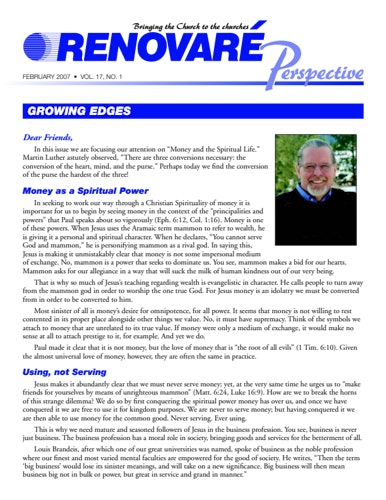Introductory Note:
It is never a bad time to revisit some foundational ideas about money and its uses for good or ill in our lives and world. Richard Foster joins us today to share some thoughts about money’s proper place in our lives, its insidious spiritual power, and its power to bless.
Renovaré Team
Martin Luther astutely observed, “There are three conversions necessary: the conversion of the heart, mind, and the purse.” Perhaps today we find the conversion of the purse the hardest of the three!
Money as a Spiritual Power
In seeking to work our way through a Christian Spirituality of money it is important for us to begin by seeing money in the context of the “principalities and powers” that Paul speaks about so vigorously (Eph. 6:12, Col. 1:16). Money is one of these powers. When Jesus uses the Aramaic term mammon to refer to wealth, he is giving it a personal and spiritual character. When he declares, “You cannot serve God and mammon,” he is personifying mammon as a rival god. In saying this, Jesus is making it unmistakably clear that money is not some impersonal medium of exchange. No, mammon is a power that seeks to dominate us. You see, mammon makes a bid for our hearts. Mammon asks for our allegiance in a way that will suck the milk of human kindness out of our very being.
That is why so much of Jesus’s teaching regarding wealth is evangelistic in character. He calls people to turn away from the mammon god in order to worship the one true God. For Jesus money is an idolatry we must be converted from in order to be converted to him.
Most sinister of all is money’s desire for omnipotence, for all power. It seems that money is not willing to rest contented in its proper place alongside other things we value. No, it must have supremacy. Think of the symbols we attach to money that are unrelated to its true value. If money were only a medium of exchange, it would make no sense at all to attach prestige to it, for example. And yet we do.
Paul made it clear that it is not money, but the love of money that is “the root of all evils” (1 Tim. 6:10). Given the almost universal love of money, however, they are often the same in practice.
Using, not Serving
Jesus makes it abundantly clear that we must never serve money; yet, at the very same time he urges us to “make friends for yourselves by means of unrighteous mammon” (Matt. 6:24, Luke 16:9). How are we to break the horns of this strange dilemma? We do so by first conquering the spiritual power money has over us, and once we have conquered it we are free to use it for kingdom purposes. We are never to serve money; but having conquered it we are then able to use money for the common good. Never serving. Ever using.
This is why we need mature and seasoned followers of Jesus in the business profession. You see, business is never just business. The business profession has a moral role in society, bringing goods and services for the betterment of all.
Louis Brandeis, after which one of our great universities was named, spoke of business as the noble profession where our finest and most varied mental faculties are empowered for the good of society. He writes, “Then the term ‘big business’ would lose its sinister meanings, and will take on a new significance. Big business will then mean business big not in bulk or power, but great in service and grand in manner.”
The Ministry of Money
Now, it goes without saying that businesses need to make a profit. A business must survive if it is to serve. And that profit can rightly be thought of as the ministry of money. This is a high call indeed, this ministry of money. It is not for the spiritual neophyte. It is for those who are well trained in the spiritual life.
“We use money to exercise our dominion for good,” says Dallas Willard. Hence, we begin by earning all the money we can, and saving all the money we can. Then, we freely use this money within a properly disciplined spiritual life, and we control and invest this money for the good of humankind and the glory of God. And, finally, we joyfully give money away where and when we have the opportunity to do the most good.
From Perspective, 2007.
Text First Published February 2007



